Chemistry REU Increases Likelihood That Students Choose STEM/Research Careers
August 30, 2013
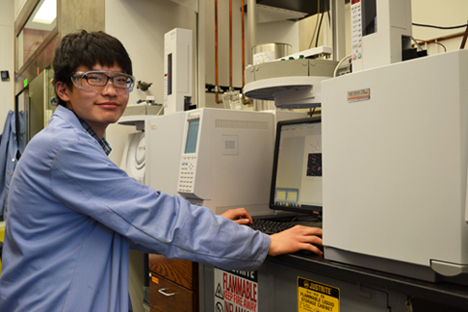
Chemistry REU participant Daniel Yo at work in the Hull Lab.
Fourteen young researchers from all over the U.S. were on campus this summer participating in a 10-week Chemistry REU program (Research Experience for Undergraduates) funded by the National Science Foundation. These undergrads experienced firsthand what research in chemistry is like at a world-class university— and what being a grad student might be like.
Some also discovered that chemistry is more than just the stereotypical lab coats and test tubes, but addresses a wide range of areas within the field.
I-STEM Research Associate Ayesha Tillman, who helps evaluate the Chemistry REU program, believes this exposure to how broad the field of chemistry is was eye-opening for many of these students. "When you think chemistry, you think beakers or chemicals, whatever. But there are so many different types of chemistry; even our Chemistry Department here, it's huge. So one of the things for the students that was really helpful was that it exposed them to the different types of chemistry."
Some of the participants themselves report that, in addition to experiencing unique, cutting-edge research, participating in the REU helped answer some crucial questions regarding their future educational and career choices, such as, "Do I want to go to graduate school?" and "Do I want to do research?" For others, the exposure to specific research helped them narrow down what they could see themselves doing (or not see themselves doing) in chemistry.
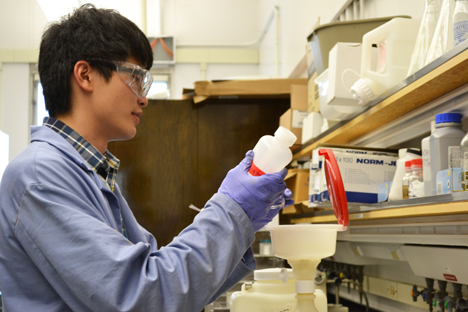
Chemistry REU participant Daniel Yo works with nitrogen-containing compounds.
Did the REU experience change participants' minds about going to graduate school? According to Tillman, many were rising juniors and seniors, "so they're still trying to figure it out…But I think it did help them decide, 'Ok, well, what type of work do I want to do?'
She believes that while grad school might have already been in students' plans for the future prior to participating in the REU, the experience might have helped answer other questions like: "'What am I going to go to graduate school in? How do I decide? What different types of chemistry graduate programs are available?'" Adds Tillman, "So I think that is one thing that the REU does; it gives them exposure."
For example, rising sophomore Daniel Yo, a chemistry major at the University of Dallas, spent his summer working under researcher Kami Hull. The research on reactions in nitrogen-containing compounds could help synthesize pharmaceuticals in a waste-free, cost-effective way.
Why did Yo participate in the REU? At the urging of advisors and other people (whom Yo then mimics, doing his best impersonation, saying, "Do it; do it; do it!"). Plus because most upperclassmen at his school had participated in a research program, Yo decided to do this REU.
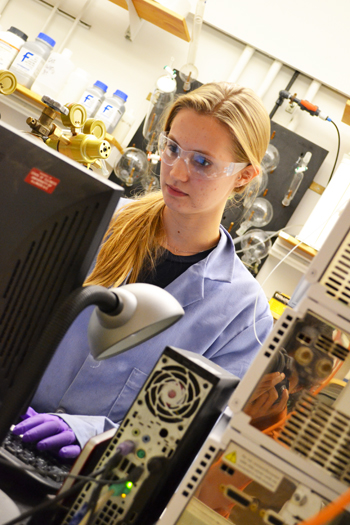
Chemistry REU undergrad Hannah Lant.
While Yo's plans are split between either attending graduate school or medical school, he eventually wants to end up in academia. And he says the REU experience increased the likelihood that he's going to consider a career in STEM.
"It impacted me greatly," acknowledges Yo, "first of all, just exposing me to this environment…not only research, but also for grad school itself…So it did encourage me to continue further in some kind of scientific career path…Just this kind of lab exposure made me acquainted with it and spurred further interest in me in what I could research in the future."
Is Yo considering Illinois? "Absolutely. This is probably on the top of my list."
Another chemistry REU student, Hannah Lant, a rising senior at Grinnel College, indicates that the experience this summer confirmed her plans to attend grad school. "This has justified those plans, and made me see that this is actually truly what I want." Lant, who would like a career in research, appreciated the chance to "see how the lab works."
A chemistry major, Lant indicates that after doing research at her own school last summer, she "kind of fell in love with it, and wanted to seek out something similar, but maybe at a larger research university." She found this REU through the NSF website and, at the urging of her professors, applied.
Mentored by Seiko Fuji, Lant spent her summer in Martin Burke's lab working on synthesizing a building block, a piece of a larger molecule called Pharmaceutical TWS 119.
Pretty sure that she is going to apply to graduate school, Lant reports that the experience has "further shown me that this is what I want. One of the cool things is seeing how the lab operates, what the life of a graduate student is like, seeing all sorts of different research that I haven't seen before."
Also, according to Lant, her work this summer took chemistry from theory to the real world: "In chemistry, you have a lot of models about the way things work, because you can't see them. So what's cool about the research that I've done this summer, it has shown me that those models do actually apply, and they do actually work, which is awesome."
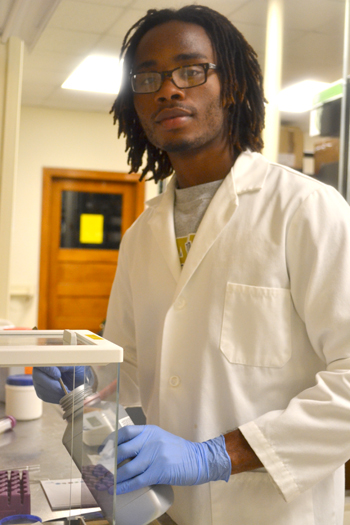
Simeyon Butler at work in researcher Mary Kraft's lab.
Is Lant considering Illinois for grad school? "It was already on my radar before this program," she acknowledges, "but doing this program has definitely solidified its position on that list."
Simeyon Butler is a junior majoring in biochemistry at Alcorn State University. Although his advisor there showed him a list of different REU programs, the only one he wanted was the one at Illinois.
"I've been planning on becoming a pharmacist," he says. "So I've been working towards finding enrichment programs that will build me towards that goal." And Simeyon felt that his experience working under Mary Kraft and grad student Rayna Kim helped to confirm his career decision.
During his research studying the effects of cholesterol depletion on proteins, Butler discovered that cholesterol adds to the morphology of the cell. An understanding of this could assist drug delivery. Butler also appreciated the professional development sessions that were part of the REU program, such as how to write a paper, how to go about research, and how to present.
Another Chemistry REU student, rising senior Morgan Hammer, attends Ohio Northern University, where he is majoring in Chemistry and applied mathematics with a minor in physics. Not new to research, Hammer participated in an REU last year as well. This summer, he worked in the Hammes-Schiffer Research Group doing computational chemistry to model properties of molecules, such as studying molecular dynamics to track how molecules move in time.
Hammer chose the Illinois REU because he is considering coming here for graduate school. "This is definitely in my top couple of choices. I'm probably going to go to grad school for theoretical chemistry, and have been pretty impressed with what I've seen here so far. Definitely a top contender, which I also knew when I applied to the program here. So I wanted to get a feel for the school and see what it was like."
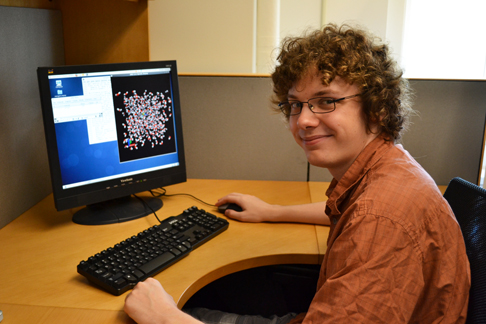
Chemistry REU undergrad Morgan Hammer working on a model of a molecule.
Evaluator Ayesha Tillman reports that the Chemistry REU seems to have gone really well this year. According to Tillman, the students bonded well and networked with each other, and the chemistry-focused professional development offered was really positive.
In addition to all the other benefits to the students, Tillman also believes the REU experience increases their chance of being accepted by graduate schools. "It may not enhance their desire or their willingness to go," she qualifies, "but I think it gives them a better chance of going, because they have this research experience that they can put on their resume."
Story by Elizabeth Innes I-STEM Communications Specialist and Sneha Shruti, I-STEM Journalism Intern. Photos by Sneha Shruti, I-STEM Journalism Intern.
More: Chemistry, REU, REU: Chemistry, Summer Research, Undergrad, 2013
For additional I-STEM articles about 2013 REU participants at Illinois, see:
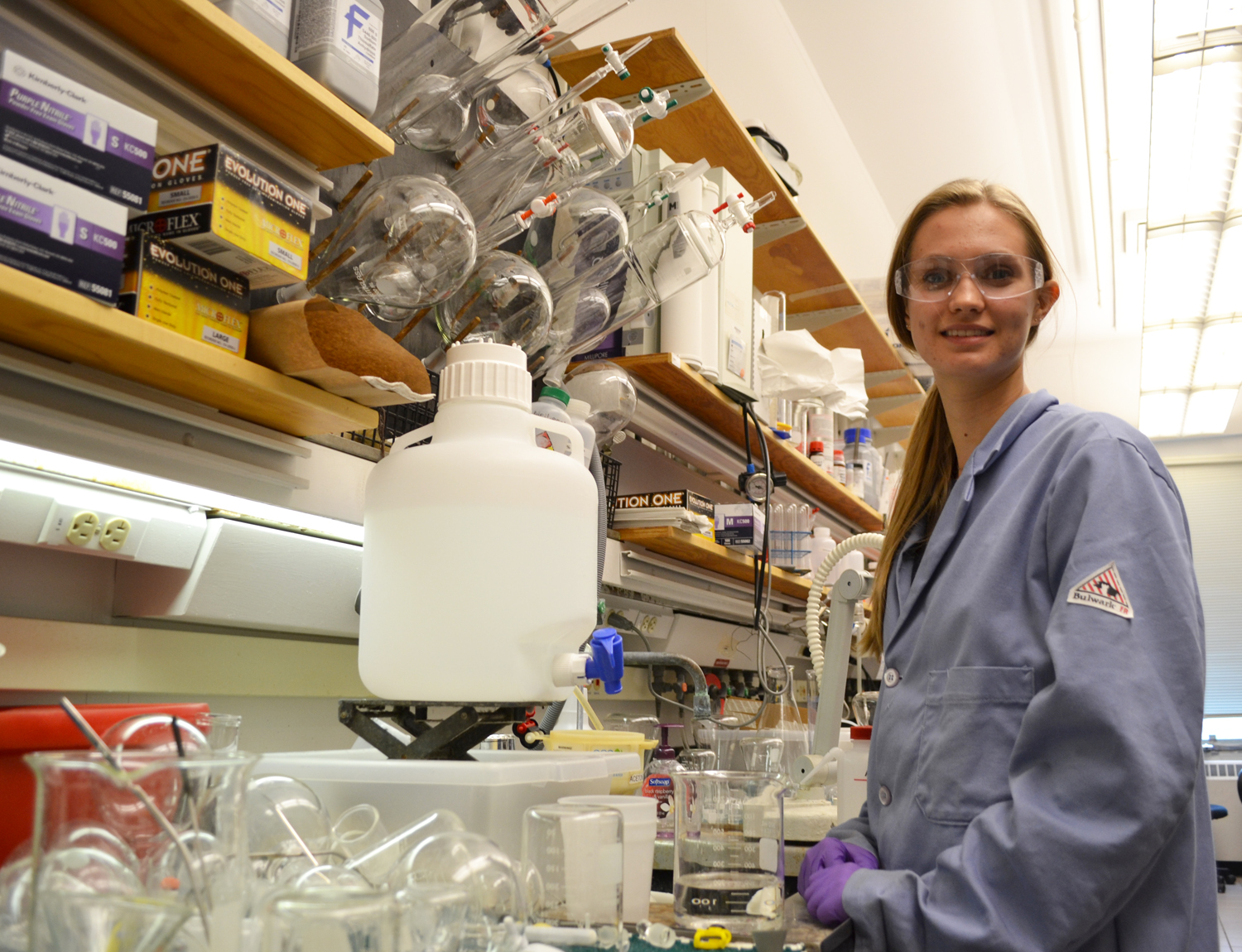
Hannah Lant works on working on synthesizing a building block in researcher Martin Burke's lab.













.jpg)
















